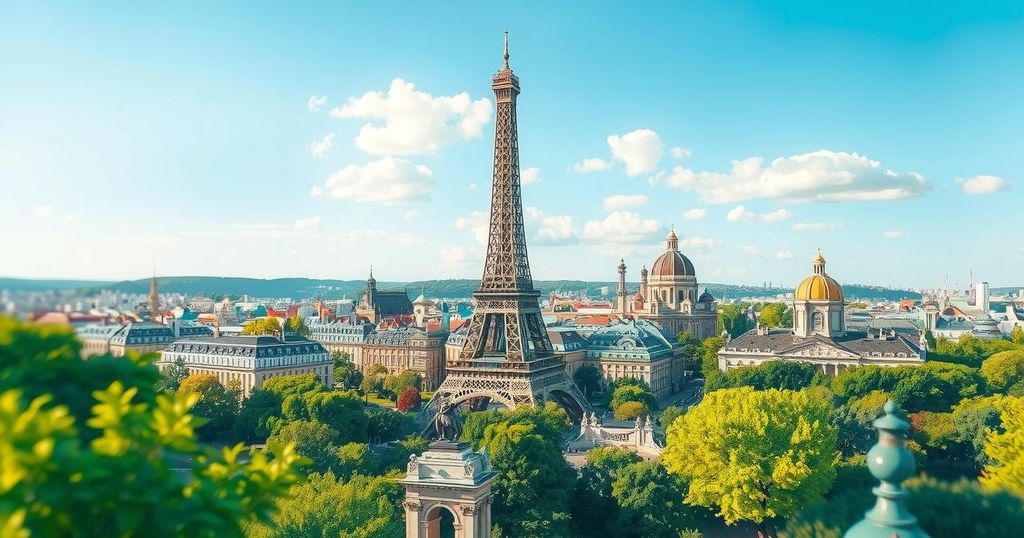Syrian Leader Ahmad Al Shara Meets Macron in Pivotal Paris Visit

Ahmad Al Shara, Syrian leader, will meet French President Emmanuel Macron in Paris, his first visit to a Western country, amid rising sectarian violence in Syria. Macron aims to support a free and stable Syria while underlining the need for an inclusive government. Al Shara is under UN sanctions, requiring France to obtain an exemption for this meeting. Recent agreements and discussions suggest a shifting diplomatic landscape despite existing challenges.
Ahmad Al Shara, the Syrian leader, is set to meet with French President Emmanuel Macron in Paris Wednesday, marking his inaugural journey to a Western nation. This visit comes amidst ongoing concerns about rising sectarian violence in Syria. According to an adviser to Mr. Macron, “The fact that we are the first western country to receive Ahmad Al Shara shows the President’s continued support for the Syrian people.” It is important to note that Al Shara, who led rebels during the Syrian civil war, is currently under UN sanctions, necessitating that France secure an exemption for this meeting.
Macron plans to reinforce France’s commitment to a “free, stable and sovereign Syria that respects all the components of the Syrian society.” His office indicated that the French president would strongly emphasize his demands on the Syrian government, particularly regarding the need for regional stability and efforts to combat terrorism. After their discussions, both leaders will hold a press conference addressing these issues.
In February, Mr. Macron invited Al Shara to visit France, and while he reiterated this offer the following month, it was contingent on Al Shara forming an inclusive government that represents all constituents of Syrian civil society. Macron has described his preliminary talks with Al Shara’s government as “positive.” The latter has pledged to establish a diverse and multi-ethnic Syria, where every religious group is safeguarded.
Recently, France has been making strides to re-establish diplomatic ties. It was among the first European countries to send a Foreign Minister to Damascus after the overthrow of Bashar Al Assad last December. Paris is also considering reopening its embassy, which was closed in 2012.
The French presidency is expected to announce Jean-Baptiste Faivre as the new charge d’affaires to Syria. Faivre, who speaks Arabic, recently concluded his term as ambassador to Qatar. During Al Shara’s visit, he will discuss significant collaborations, including a recent 30-year agreement signed with French shipping firm CMA CGM, involving $260 million in investments in Syria’s Latakia port.
Despite these efforts, the humanitarian aftermath of 14 years of civil war looms large, with estimates indicating that Syria will require approximately $250 billion for reconstruction. Sanctions from the United States and the European Union complicate Syria’s reintegration into the global economy. An adviser noted that the ongoing sanctions will be an integral topic of discussion in Paris.
In the face of intense sectarian violence—recently resulting in over 1,700 fatalities—cautious optimism surrounds Al Shara’s pledges to protect minority groups. However, instability persists, undermining the government’s ability to counter extremism effectively. Meanwhile, Israel has conducted numerous air strikes in Syria, aimed at supporting the Druze minority who have endured significant casualties. Maintaining a good rapport with Syria’s Druze community is a priority for Israeli authorities.
Al Shara’s visit is part of a broader strategy by his administration to engage with international stakeholders and reestablish Syria in global affairs. Recently, Syrian Foreign Minister Asaad Al Shibani met US State Department officials in New York, marking the first dialogue between US officials and Syria in recent years.
Al Shara’s upcoming meeting with Macron signifies a pivotal moment in Syria’s attempt to regain its footing on the international stage. While there are strides in diplomatic relations and discussions on recovery efforts, deeply rooted challenges—particularly sectarian violence and external sanctions—pose significant obstacles. With conflicting dynamics, the situation in Syria remains delicate as the country navigates its way through reconstruction and seeks cooperation from global players.
Original Source: www.thenationalnews.com







